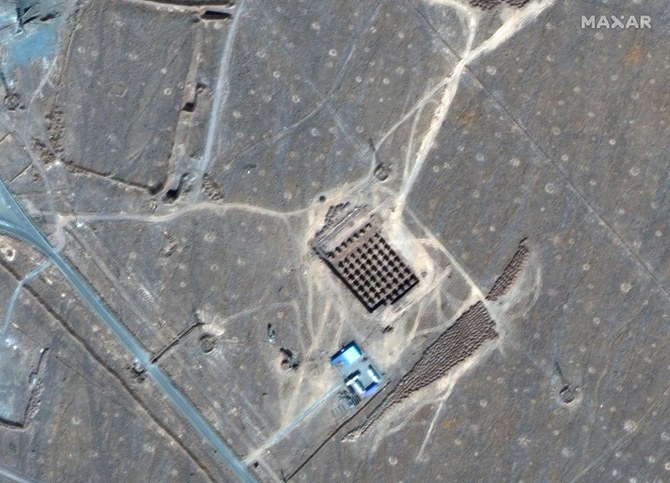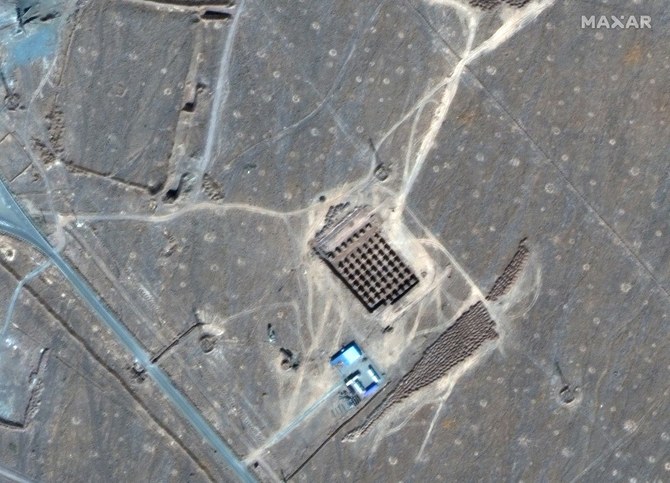DUBAI: Iran said on Monday it will block snap inspections by the UN nuclear watchdog from next week if other parties to the 2015 nuclear deal do not fulfil their obligations, a challenge to US President Joe Biden’s hope of reviving the accord.
“If others do not fulfil their obligations by Feb. 21, the government is obliged to suspend the voluntary implementation of the Additional Protocol,” Foreign Ministry spokesman Saeed Khatibzadeh said.
“It does not mean ending all inspections by the UN nuclear watchdog...All these steps are reversible if the other party changes its path and honors its obligations,” he said, alluding to the United States.
The Biden administration aims to return the United States to the nuclear deal, which his predecessor Donald Trump abandoned in 2018. Under the deal, Iran agreed to curbs on its uranium enrichment program in return for the lifting of sanctions.
After Trump quit and reimposed sanctions, Iran began violating some limits in the deal. Washington and Tehran now disagree over how best to restore the accord, with both sides demanding the other side act first to return to compliance.
Despite Iran’s public hard line that Washington must take the first step, several Iranian officials told Reuters last week that the mounting economic pain of US sanctions may push Tehran to be flexible on terms for restoring the nuclear deal.
The nuclear deal granted wide-ranging access to the International Atomic Energy Agency to gather information on Iran’s nuclear activities. But under a law enacted last year, Iran’s government is obliged to revoke that access on Feb. 21 if other parties are not complying with the nuclear deal.
Iran has long denied striving to develop nuclear weapons through uranium enrichment, though its intelligence minister said last week persistent Western pressure could push Tehran to fight back like a “cornered cat” and seek nuclear weapons.
But Khatibzadeh rejected this, citing a religious decree issued in the early 2000s by the Islamic Republic’s top authority, Supreme Leader Ayatollah Ali Khamenei, banning the pursuit of nuclear arms.
Iran says it will end snap IAEA inspections if nuclear deal terms not met
https://arab.news/8cmm3
Iran says it will end snap IAEA inspections if nuclear deal terms not met

- Iran has insisted that the US must lift sanctions before it returns to the nuclear deal's nuclear restrictions
- The nuclear deal granted wide-ranging access to the International Atomic Energy Agency to gather information on Iran’s nuclear activities
Jordan says 18,000 Syrians returned home since Assad’s fall

Interior Minister Mazen Al-Faraya told state TV channel Al-Mamlaka that “around 18,000 Syrians have returned to their country between the fall of the regime of Bashar Assad on December 8, 2024 until Thursday.”
He said the returnees included 2,300 refugees registered with the United Nations.
Amman says it has hosted about 1.3 million Syrians who fled their country since civil war broke out in 2011, with 650,000 formally registered with the United Nations.
Lebanon hopes for neighborly relations in first message to new Syria government

- Lebanon’s Iran-backed Hezbollah played a major part propping up Syria’s ousted President Bashar Assad through years of war
- Syria’s new Islamist de-facto leader Ahmed Al-Sharaa is seeking to establish relations with Arab and Western leaders
DUBAI: Lebanon said on Thursday it was looking forward to having the best neighborly relations with Syria, in its first official message to the new administration in Damascus.
Lebanese Foreign Minister Abdallah Bou Habib passed the message to his Syrian counterpart, Asaad Hassan Al-Shibani, in a phone call, the Lebanese Foreign Ministry said on X.
Lebanon’s Iran-backed Hezbollah played a major part propping up Syria’s ousted President Bashar Assad through years of war, before bringing its fighters back to Lebanon over the last year to fight in a bruising war with Israel – a redeployment which weakened Syrian government lines.
Under Assad, Hezbollah used Syria to bring in weapons and other military equipment from Iran, through Iraq and Syria and into Lebanon. But on Dec. 6, anti-Assad fighters seized the border with Iraq and cut off that route, and two days later, Islamist militants captured the capital Damascus.
Syria’s new Islamist de-facto leader Ahmed Al-Sharaa is seeking to establish relations with Arab and Western leaders after toppling Assad.
Iraqi intelligence chief discusses border security with new Syrian administration

BAGHDAD: An Iraqi delegation met with Syria’s new rulers in Damascus on Thursday, an Iraqi government spokesman said, the latest diplomatic outreach more than two weeks after the fall of Bashar Assad’s rule.
The delegation, led by Iraqi intelligence chief Hamid Al-Shatri, “met with the new Syrian administration,” government spokesman Bassem Al-Awadi told state media, adding that the parties discussed “the developments in the Syrian arena, and security and stability needs on the two countries’ shared border.”
Israeli minister’s Al-Aqsa mosque visit sparks condemnation

- Ben Gvir has repeatedly defied the Israeli government’s longstanding ban on Jewish prayer at the site in Israeli-annexed east Jerusalem
JERUSALEM: Israel’s National Security Minister Itamar Ben Gvir visited Jerusalem’s Al-Aqsa mosque compound on Thursday, triggering angry reactions from the Palestinian Authority and Jordan accusing the far-right politician of a deliberate provocation.
Ben Gvir has repeatedly defied the Israeli government’s longstanding ban on Jewish prayer at the site in Israeli-annexed east Jerusalem, which is revered by both Muslims and Jews and has been a focal point of tensions in the Israeli-Palestinian conflict.
“I went up to the site of our temple this morning to pray for the peace of our soldiers, the swift return of all hostages and a total victory, God willing,” Ben Gvir said in a message on social media platform X, referring to the Gaza war and the dozens of Israeli captives held in the Palestinian territory.
He also posted a photo of himself on the holy site, with members of the Israeli security forces and the famed golden Dome of the Rock in the background.
The Al-Aqsa compound in Jerusalem’s Old City is Islam’s third-holiest site and a symbol of Palestinian national identity.
Known to Jews as the Temple Mount, it is also Judaism’s holiest place, revered as the site of the second temple destroyed by the Romans in 70 AD.
Under the status quo maintained by Israel, which has occupied east Jerusalem and its Old City since 1967, Jews and other non-Muslims are allowed to visit the compound during specified hours, but they are not permitted to pray there or display religious symbols.
Palestinians claim east Jerusalem as their future capital, while Israeli leaders have insisted that the entire city is their “undivided” capital.
The Palestinian Authority’s foreign ministry said in a statement that it “condemns” Ben Gvir’s latest visit, calling his prayer at the site a “provocation to millions of Palestinians and Muslims.”
Jordan, which administers the mosque compound, similarly condemned what its foreign ministry called Ben Gvir’s “provocative and unacceptable” actions.
The ministry’s statement decried a “violation of the historical and legal status quo.”
The office of Israeli Prime Minister Benjamin Netanyahu said in a brief statement that “the status quo on the Temple Mount has not changed.”
UN force sounds alarm over Israeli ‘destruction’ in south Lebanon

- Under the ceasefire agreement, UNIFIL peacekeepers and the Lebanese army were to redeploy in south Lebanon, near the Israeli border, as Israeli forces withdrew over 60 days
BEIRUT: The United Nations’ peacekeeping force in Lebanon expressed concern on Thursday at the “continuing” damage done by Israeli forces in the country’s south despite a ceasefire in the war with Hezbollah.
The truce went into effect on November 27, about two months after Israel stepped up its bombing campaign and later sent troops into Lebanon following nearly a year of exchanges of cross-border fire initiated by Hezbollah over the war in Gaza.
The warring sides have since traded accusations of violating the truce.
Under the ceasefire agreement, UNIFIL peacekeepers and the Lebanese army were to redeploy in south Lebanon, near the Israeli border, as Israeli forces withdrew over 60 days.
UNIFIL said in a statement on Thursday that “there is concern at continuing destruction by the IDF (army) in residential areas, agricultural land and road networks in south Lebanon.”
The statement added that “this is in violation of Resolution 1701,” which was adopted by the UN Security Council and ended the last Israel-Hezbollah war of 2006.
The UN force also reiterated its call for “the timely withdrawal” of Israeli troops from Lebanon, and “the full implementation of Resolution 1701.”
The resolution states that Lebanese troops and UN peacekeepers should be the only forces in south Lebanon, where Hezbollah exerts control, and also calls for Israeli troops to withdraw from Lebanese territory.
“Any actions that risk the fragile cessation of hostilities must cease,” UNIFIL said.
On Monday the force had urged “accelerated progress” in the Israeli military’s withdrawal.
Lebanon’s official National News Agency (NNA) reported on Thursday “extensive” operations by Israeli forces in the south.
It said residents of Qantara fled to a nearby village “following an incursion by Israeli enemy forces into their town.”
On Wednesday the NNA said Israeli aircraft struck the eastern Baalbek region, far from the border.


















